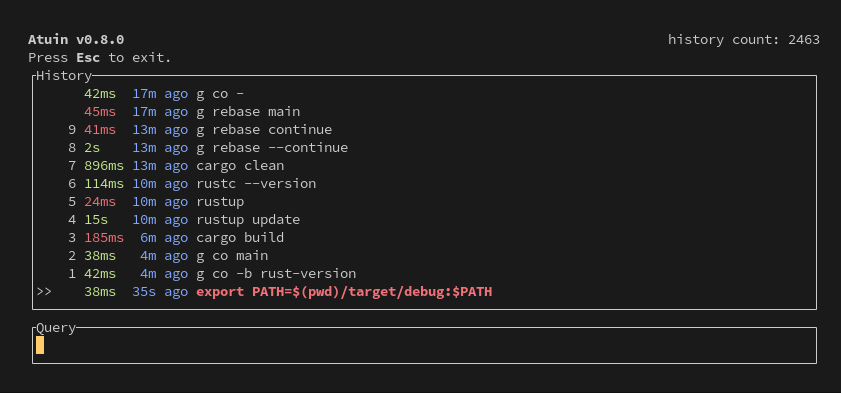1
2
3
4
5
6
7
8
9
10
11
12
13
14
15
16
17
18
19
20
21
22
23
24
25
26
27
28
29
30
31
32
33
34
35
36
37
38
39
40
41
42
43
44
45
46
47
48
49
50
51
52
53
54
55
56
57
58
59
60
61
62
63
64
65
66
67
68
69
70
71
72
73
74
75
76
77
78
79
80
81
82
83
84
85
86
87
88
89
90
91
92
93
94
95
96
97
98
99
100
101
102
103
104
105
106
107
108
109
110
111
112
113
114
115
116
117
118
119
120
121
122
123
124
125
126
127
128
129
130
131
132
133
134
135
136
137
138
139
140
141
142
143
144
145
146
147
148
149
150
151
152
153
154
155
156
157
158
159
160
161
162
163
164
165
166
167
168
169
170
171
172
173
174
175
176
177
178
179
180
181
182
183
184
185
186
187
188
189
190
191
192
193
194
195
196
197
198
199
200
201
202
203
204
205
206
207
|
# Config
Atuin maintains two configuration files, stored in `~/.config/atuin/`. We store
data in `~/.local/share/atuin` (unless overridden by XDG\_\*).
You can also change the path to the configuration directory by setting
`ATUIN_CONFIG_DIR`. For example
```
export ATUIN_CONFIG_DIR = /home/ellie/.atuin
```
## Client config
```
~/.config/atuin/config.toml
```
The client runs on a user's machine, and unless you're running a server, this
is what you care about.
See [config.toml](../atuin-client/config.toml) for an example
### `dialect`
This configures how the [stats](stats.md) command parses dates. It has two
possible values
```
dialect = "uk"
```
or
```
dialect = "us"
```
and defaults to "us".
### `auto_sync`
Configures whether or not to automatically sync, when logged in. Defaults to
true
```
auto_sync = true/false
```
### `update_check`
Configures whether or not to automatically check for updates. Defaults to
true.
```
update_check = true/false
```
### `sync_address`
The address of the server to sync with! Defaults to `https://api.atuin.sh`.
```
sync_address = "https://api.atuin.sh"
```
### `sync_frequency`
How often to automatically sync with the server. This can be given in a
"human-readable" format. For example, `10s`, `20m`, `1h`, etc. Defaults to `1h`.
If set to `0`, Atuin will sync after every command. Some servers may potentially
rate limit, which won't cause any issues.
```
sync_frequency = "1h"
```
### `db_path`
The path to the Atuin SQlite database. Defaults to
`~/.local/share/atuin/history.db`.
```
db_path = "~/.history.db"
```
### `key_path`
The path to the Atuin encryption key. Defaults to
`~/.local/share/atuin/key`.
```
key = "~/.atuin-key"
```
### `session_path`
The path to the Atuin server session file. Defaults to
`~/.local/share/atuin/session`. This is essentially just an API token
```
key = "~/.atuin-session"
```
### `search_mode`
Which search mode to use. Atuin supports "prefix", fulltext and "fuzzy" search
modes. The prefix searches for "query\*", fulltext "\*query\*", and fuzzy applies
the search syntax [described below](#fuzzy-search-syntax).
Defaults to "prefix"
### `style`
Which style to use. Possible values: `auto`, `full` and `compact`.
- `compact`:

- `full`:

Defaults to `auto`.
### `filter_mode`
The default filter to use when searching
| Column1 | Column2 |
|--------------- | --------------- |
| global (default) | Search history from all hosts, all sessions, all directories |
| host | Search history just from this host |
| session | Search history just from the current session |
| directory | Search history just from the current directory|
Filter modes can still be toggled via ctrl-r
```
filter_mode = "host"
```
### `filter_mode_shell_up_key_binding`
The default filter to use when searching and being invoked from a shell up-key binding.
Accepts exactly the same options as `filter_mode` above
```
filter_mode_shell_up_key_binding = "session"
```
### `exit_mode`
What to do when the escape key is pressed when searching
| Value | Behaviour |
|------------------------- | --------------- |
| return-original (default) | Set the command-line to the value it had before starting search |
| return-query | Set the command-line to the search query you have entered so far |
Pressing ctrl+c or ctrl+d will always return the original command-line value.
```
exit_mode = "return-query"
```
#### `fuzzy` search syntax
The "fuzzy" search syntax is based on the
[fzf search syntax](https://github.com/junegunn/fzf#search-syntax).
| Token | Match type | Description |
| --------- | -------------------------- | ------------------------------------ |
| `sbtrkt` | fuzzy-match | Items that match `sbtrkt` |
| `'wild` | exact-match (quoted) | Items that include `wild` |
| `^music` | prefix-exact-match | Items that start with `music` |
| `.mp3$` | suffix-exact-match | Items that end with `.mp3` |
| `!fire` | inverse-exact-match | Items that do not include `fire` |
| `!^music` | inverse-prefix-exact-match | Items that do not start with `music` |
| `!.mp3$` | inverse-suffix-exact-match | Items that do not end with `.mp3` |
A single bar character term acts as an OR operator. For example, the following
query matches entries that start with `core` and end with either `go`, `rb`,
or `py`.
```
^core go$ | rb$ | py$
```
### history_filter
The history filter allows you to exclude commands from history tracking - maybe you want to keep ALL of your `curl` commands totally out of your shell history, or maybe just some matching a pattern.
This supports regular expressions, so you can hide pretty much whatever you want!
```
## Note that these regular expressions are unanchored, i.e. if they don't start
## with ^ or end with $, they'll match anywhere in the command.
history_filter = [
"^secret-cmd",
"^innocuous-cmd .*--secret=.+"
]
```
|
